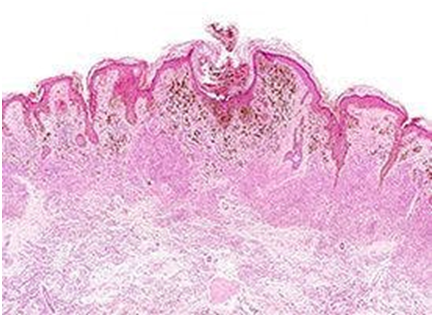July 21, 2023
Chris Ryan
The European Medicines Agency’s Committee for Medicinal Products for Human Use has recommended approval of nivolumab monotherapy for the adjuvant treatment of patients at least 12 years of age with completely resected stage IIB or IIC melanoma.

Melanoma
The European Medicines Agency’s Committee for Medicinal Products for Human Use (CHMP) has recommended approval of nivolumab (Opdivo) monotherapy for the adjuvant treatment of patients at least 12 years of age with completely resected stage IIB or IIC melanoma.1
The positive opinion is supported by data from the phase 3 CheckMate76K trial (NCT04099251), which showed that nivolumab reduced the risk of recurrence or death by 58% compared with placebo (HR, 0.42; 95% C, 0.30-0.59; P < .0001). The 12-month recurrence-free survival (RFS) rates were 89% (95% CI, 86%-92%) for nivolumab vs 79% (95% CI, 74%-84%) for placebo.2
“Many patients with stage IIB or stage IIC melanoma face the difficult reality of disease recurrence within 5 years of surgery,” Gina Fusaro, PhD, vice president, global program lead, Bristol Myers Squibb, stated in a news release.1 “In the data from the CheckMate76K trial, [nivolumab] was shown to significantly reduce the risk of disease recurrence for these patients. The CHMP’s recommendation brings us closer to potentially providing [nivolumab] for use in treating additional earlier stages of melanoma in the adjuvant setting, addressing an unmet need for patients in the European Union.”
CheckMate76K was a randomized, double-blind study that enrolled patients at least 12 years of age with histologically confirmed, resected, stage IIB/C cutaneous melanoma with no evidence of disease who were at a high risk for recurrence.3 Patients were required to have a negative sentinel lymph node biopsy and not been previously treated for melanoma. An ECOG performance status of 0 or 1 was also required.
Key exclusion criteria included a history of ocular or mucosal melanoma, known or suspected active autoimmune disease, and prior treatment with an anti–PD-1, –PD-L1, –PD-L2, -CD137, or –CTLA-4 antibody, or agents targeting interleukin-2 pathways, T-cell stimulators, or checkpoint pathways.
Patients were randomly assigned to receive 480 mg of nivolumab every 4 weeks for up to 12 months or placebo.
RFS served as the trial’s primary end point. Secondary end points included overall survival, distant metastases-free survival, progression-free survival on next-line therapy, and safety.
Additional data showed that among patients with stage IIB disease, the 12-month RFS rates were 93% for those given nivolumab and 84% for those given placebo. In patients with stage IIC disease, the 12-month RFS rates for nivolumab and placebo were 84% and 72%, respectively.2
Regarding safety, findings for nivolumab were consistent with previous studies, and no new safety signals were reported. Grade 3/4 treatment-related adverse effects (TRAEs) occurred in 10% of patients in the nivolumab arm vs 2% of patients in the placebo arm. Additionally, 15% of patients in the nivolumab and 3% of patients in the placebo arm discontinued treatment due to TRAEs.
References
1. Bristol Myers Squibb receives positive CHMP opinion recommending approval for Opdivo (nivolumab) as an adjuvant treatment for patients with completely resected stage IIB or IIC melanoma. News release. Bristol Myers Squibb. July 21, 2023. Accessed July 21, 2023. https://news.bms.com/news/corporate-financial/2023/Bristol-Myers-Squibb-Receives-Positive-CHMP-Opinion
2. Bristol Myers Squibb presents data from CheckMate -76K showing Opdivo (nivolumab) reduced the risk of recurrence or death by 58% versus placebo in patients with completely resected stage IIB or IIC melanoma. News release. Bristol Myers Squibb. October 19, 2022. Accessed July 21, 2023. https://news.bms.com/news/details/2022/Bristol-Myers-Squibb-Presents-Data-from-CheckMate--76K
3. Effectiveness study of nivolumab compared to placebo in prevention of recurrent melanoma after complete resection of stage IIB/C melanoma (CheckMate76K). ClinicalTrials.gov. Updated March 13, 2023. Accessed July 21, 2023. https://classic.clinicaltrials.gov/ct2/show/NCT04099251






Post comments